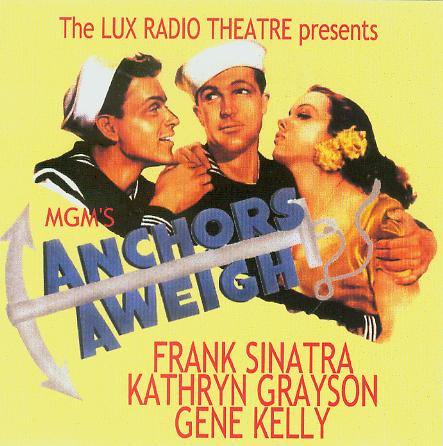Kelly is traditionally seen as a masculine, physical dancer, and in all of the roles that I have seen him in, he is romantically successful. One of my favorite movies is Singin' in the Rain, a perfect example of Kelly's ability to dance and to look strong, attractive, and appealing while doing it. In Anchors Aweigh, Kelly's character Joe is supposed to be a total ladies' man and a complete catch, but I had a hard time believing it. Joe seemed like he was trying too hard to be a big stud. Between Joe's overemphasis of his success with women and Clarence's slavish desire for Joe's tutelage, I detected an undercurrent of homoeroticism throughout the movie.
In the opening musical number, "We Hate to Leave", Clarence and Joe tell their shipmates just how sorry they are to head off the boat and over to shore. Couched in their faux sympathy for leaving their compatriots behind, Joe and Clarence sing and wink, "No more pin-up gals that we so enjoy/Tonight, my boy, we get to meet the Real McCoy". The rest of the song goes on about meeting "beautiful dames in their soft silk dresses" and leaving behind "these guys sitting here in their undershirts". Clarence and Joe's excitement to go out and meet girls seems forced and exaggerated. Later, in "I Begged Her", Joe and Clarence recount the fictive encounters they had with women during the night to their fellow sailors. Joe sings of having to beg, plead, and eventually threaten his girl to get a kiss; Clarence sings of a girl begging him, pleading with him, and threatening him. By creating these romantic encounters, Clarence and Joe act as caricatures of what they think sailors on shore leave should be like.
Clarence's admiration for Joe almost appears to stem from more than simple gratitude. He is unable to take his eyes off Joe when Joe sings, dances (more understandable--Sinatra wasn't much for dancing, so he was following Kelly's lead), speaks, or sits. Clarence even comments on Joe's body ("He's got muscles!").
At the end of the film, after much back-and-forth, Clarence and Joe get the girls. As they embrace their respective girlfriends, they turn and smile at each other.
I would doubt that these homoerotic cues were on the radars of the producers/directors/actors at the time the film was made. However, it is interesting to note that they are present in the movie. I probably picked up on them so strongly because as I was screening the film, I was hyper-aware that I was watching Frank Sinatra and Gene Kelly, two "manly men". As innocent, naive Clarence, Sinatra plays so strongly against the cool, debonair image of Sinatra that I have in my head.




No comments:
Post a Comment